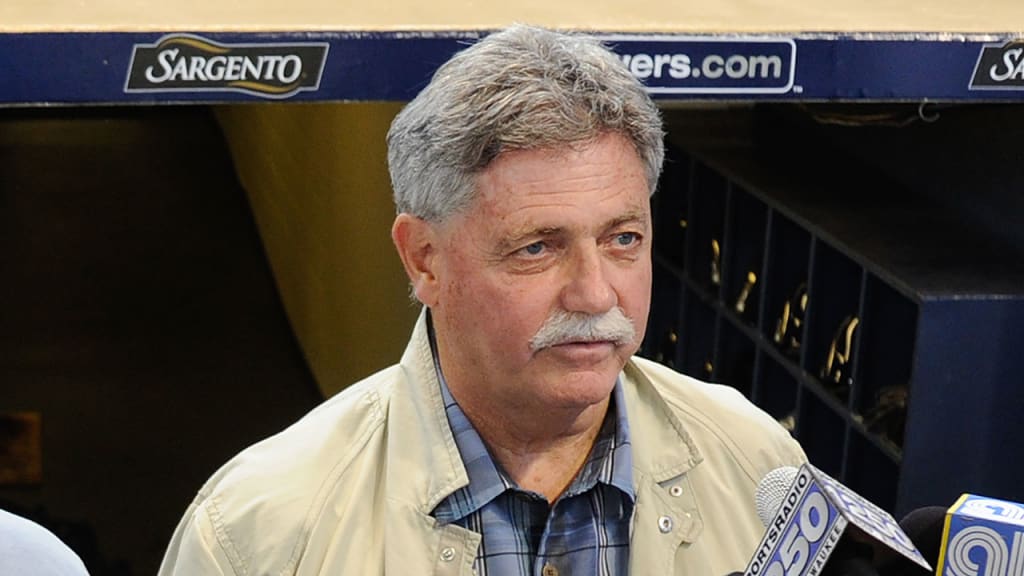
MILWAUKEE -- Doug Melvin has an idea to solve the designated hitter debate: Instead of taking the bat completely out of pitchers' hands, allow National League teams to designate a player on each bench to pinch-hit twice in a game. That would reduce the likelihood of a high-priced starting pitcher getting hurt swinging a bat and also help managers deal with benches squeezed by expanding bullpens, all while preserving some of the strategy unique to NL play.
"That's my hybrid idea," Melvin said. "Offensive numbers for pitchers are worse than ever, and there's nothing more depressing than when you've got a rally going and all of a sudden, the pitcher comes up with the bases loaded, two outs and no chance.
"I think the strategy of it could be pretty fun."
It's the sort of out-of-the box idea that has long fascinated Melvin, a 63-year-old baseball lifer who finally has the time to mull such matters now that his cell phone stopped buzzing.
Thursday marks six months since Melvin announced that he was stepping aside as general manager of the Brewers, a post he held for 13 seasons. Before that he spent seven seasons as GM of the Rangers.
That adds up to 20 years in baseball's most nonstop job. With Melvin approaching retirement age and the Brewers entering a rebuilding phase, it was time, he decided with principal owner Mark Attanasio, for something different. At season's end, he transitioned to be senior advisor to a new GM less than half his age, David Stearns.
"You do sleep better," Melvin said.
He's done more than sleep. With Stearns and new assistant GM Matt Arnold in charge, Melvin has returned to his player-development roots. Ray Montgomery, amateur scouting director, invited Melvin to Houston for four days of meetings with the team's scouts. Melvin also spent five days in Phoenix at the Brewers' instructional league and the Arizona Fall League. He only briefly attended the GM Meetings in November to receive a 20-year service award. At the Winter Meetings in December, he had time to catch up with old friends in the lobby.
He's also had more time for real life. This past fall he spent a full week in Tampa, Fla., where son Cory, a Brewers scout, was married. He's enjoyed several weeks at the family's second home in Park City, Utah, where he reads and goes snowshoeing. He visited his parents in Ontario. In Milwaukee he has attended Bucks games with their GM, John Hammond, a good friend.
Melvin still occupies the same office at Miller Park but keeps a more flexible schedule, and he summed up his role like this: "I'm there when they need me."
He has a multiyear agreement with Attanasio, though both sides have declined to make the terms public.
"Doug has been really good about remembering -- and he talked to me a lot about this -- what it was like when he first took the seat," said Attanasio, who has owned the Brewers since the end of the 2004 season. "So he wants to be supportive of David in the same way he felt supported, but he doesn't want David to feel he's second-guessed. I think Doug is doing really nicely."
Melvin concedes that he will miss the intense competition that comes with the regular season. And when a prospect makes it to the Majors and succeeds, he won't get quite the same level of satisfaction.
The wins won't be as sweet, and the losses not quite as biting.
"It's like the difference between a coach and a manager," Melvin said. "When you're a coach, you have your certain responsibilities. You're available. But when you're the manager, you feel responsible to 25 players, plus the coaches and the trainers and everybody.
"It's like that as a general manager. You feel a total responsibility. Pro scouting, amateur scouting, international scouting, player development, the Major League team -- there's always something to think about. There's just so much involved."
All of those areas are Stearns' responsibility now. Melvin has been impressed by Stearns' energy and commitment to a specific philosophy of team-building.
The two will remain linked for some time, since Melvin began the rebuilding process that Stearns has continued. It was Melvin who traded Aramis Ramirez, Carlos Gomez, Mike Fiers and Gerardo Parra for prospects. Stearns netted yet more prospects by trading Francisco Rodriguez, Adam Lind and Jean Segura.
"He's got a lot of challenges ahead of him, some of which I'm sure he's expecting, and some probably not," Melvin said. "When I took the job in Texas, Kenny Rogers had thrown a perfect game, and the debate was whether Kenny Rogers got to keep the uniform or the team. That was one of my first things. Then a player's wife met with me to determine whether they pay for the babysitters or we pay for the babysitters.
"You think you're just going to deal with player personnel. I learned in a hurry."
Melvin is already in Phoenix awaiting the start of Spring Training. Brewers pitchers and catchers report on Feb. 19.
"You know, when a player retires, he says the things he misses most are the other players in the clubhouse," Melvin said. "For a GM, it's the people who work so hard for you; the people in the office and the managers and the coaches from the big leagues to the Minor Leagues, the scouts. All of those people who take time away from their families and give it to the ballclub.
"What you miss out on as a GM sometimes is learning more about those people. I always said, 'We don't know enough about our own people.' Now I'm asking about their kids more, their wives more. When you're in the job, you're so focused that you forget about those things that are important to your people."
Oh, and there's another benefit.
"I'm trying to get in better shape. That hasn't happened so far," he said. "That's still on my agenda."